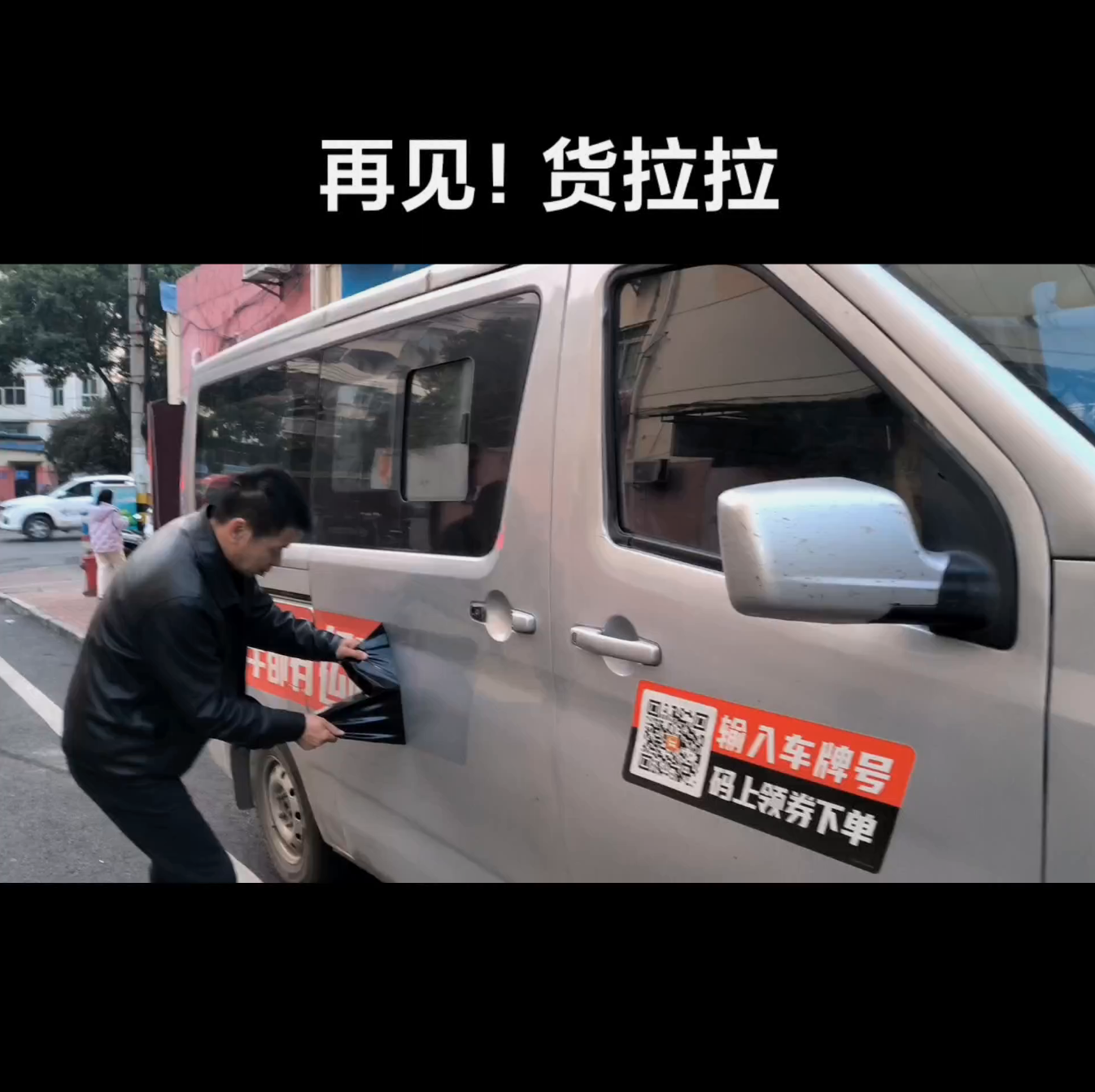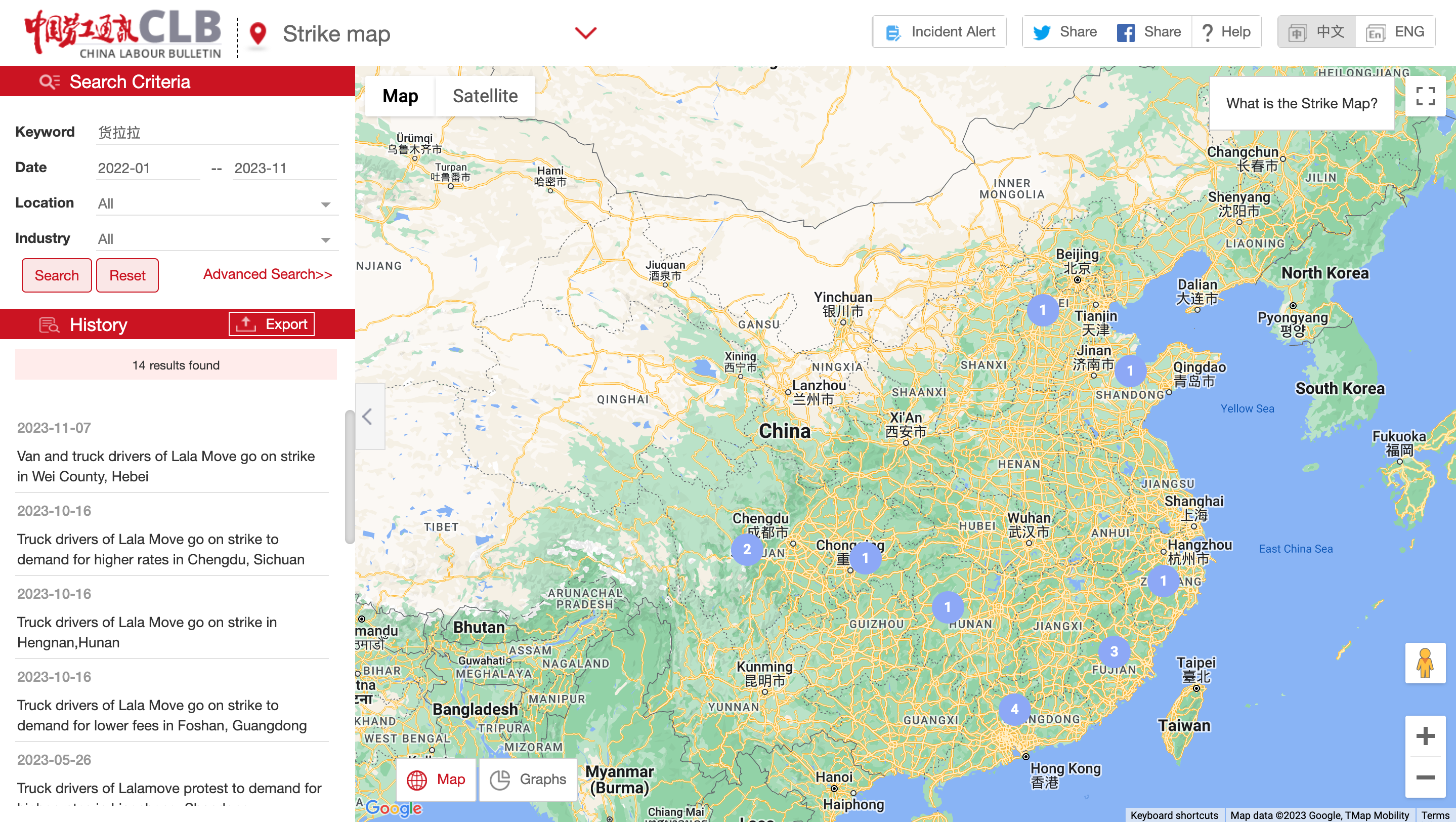A driver for platform company Huolala (Lalamove) posted an image of himself ripping the branded decals off his van in early December 2023, accompanied by a written announcement:
Today is 7 December 2023, and I've made a decision. I am completely quitting the Huolala freight platform. From working for Didi ride-hailing to now Huolala, I've wasted a full six years of my life. Nothing has changed; I'm still struggling. Doing this work only solves immediate needs, but doesn't address any of my debts, and offers no prospects for the future.
Driver Lao Guo (老郭) wrote this bitter statement after Huolala fully implemented a new pricing model that makes drivers bid for customer orders based on the quantity of goods transported.

Lao Guo posted a photo of himself peeling off the Huolala branded decals from his van and wrote “Goodbye, Huolala!” above the photo. Source: Toutiao
Drivers see this pricing mechanism, which began implementation earlier this year, as a disguised rate reduction that pits them against each other. They also face safety risks on the road because of increased pressure.
Lao Guo drives a mid-sized van, and he said in a video posted online in mid-October that the price per kilometre is, on average, less than 1.5 yuan. After deducting fees paid to the platform, it is now rare to receive an order that offers as much as 2 yuan per kilometre is rare. He said:
With prices already so low, the platform is still forcing through the new bidding system. I really cannot understand the mind of those in charge.
Lao Guo said in his video that he did not want to give in to the low prices and would refrain from taking orders. However, even if he wanted to take orders, he may have difficulty finding a suitable one.
For example, he showed his audience an order offering 120 yuan and that was within 50 metres from his location. When he clicked to accept the order in the app, it was immediately rejected.
You see, even though it's within 50 metres, I still can’t grab it. What should I do?
He then showed a record that said he made 16 attempts that day, with only one success. In another video in early November, he showed a record with zero successes after 12 attempts.
Intense competition between platform truck and van drivers has destabilised platforms like Huolala. Insufficient orders have caused mid-sized van drivers to accept orders which are priced for small-sized vans. As a result, customers with orders requiring mid-sized vans simply order a cheaper small-sized van.
Drivers new to the platform may grab up undesirable orders like this, regardless of the price. Some long-time drivers started setting up fake orders to trap new drivers. But these tactics are controversial, with some drivers urging colleagues to not vent their anger on other drivers, who are also victims of the platform’s policies.
Instead, the problem lies in the platform itself.
On 16 October 2023, Huolala drivers in three cities went on strike against the new order model. In Foshan, Guangdong province, and Hengyang, Hunan province, drivers parked their trucks outside Huolala offices, blocking the entrances. In Chengdu, Sichuan province, over 100 drivers gathered at a Huolala pickup point to negotiate with management. On 7 November, a fourth strike broke out in Wei County, Hebei province.
There were fourteen Huolala drivers strikes logged in CLB’s Strike Map between 2022 and 2023 (seven strikes each year). This increase in workers’ collective actions is related to the company’s response to market conditions. As Huolala strives to be listed on the Hong Kong Stock Exchange, it has been increasing drivers’ commissions over time to turn from loss to profit.

CLB’s Strike Map shows fourteen strikes by Huolala drivers across China since 2022. These were concentrated in November 2022 (7 incidents), May 2023 (3 incidents), and October and November 2023 (4 incidents).
In late 2022, drivers reacted by launching a strike for three consecutive days in various parts of China. The drivers in Guangzhou submitted a list of sixteen concrete demands related to recent corporate changes that reduced drivers’ pay by as much as 20 percent. Another wave of strikes broke out in mid-2023, with drivers protesting a drop in unit prices. The government responded to each wave of strikes through measures targeting domestic freight platforms.
On 23 November 2023 at a regular press conference, Han Jinghua, Deputy Director of the Transport Service Department, said that the department had urged “major online road freight platform companies” - including Manbang Group, Huolala, and Didi Freight - to “lower the excessively high commission rates and membership fee caps.” Since then, he said that “all platform companies have already reduced the commission rates or membership fee caps, with a decrease ranging from 1 to 3 percentage points."
The government singled out Huolala by holding yet another meeting with the company in December 2023, strongly urging them to “correct problems” in their business operations. The authorities had similarly called in Huolala and other companies following the November 2022 and May 2023 strikes.
Huolala is now referred to as a trap (坑) among drivers. The comments under Lao Guo’s post announcing that he is quitting platform work received a range of such comments:
Congratulations on getting out of the trap!
In fact, many platforms are a trap. Try not to enter the platforms!
Smart move!
It would have been wise to get out of the trap years ago.
Drivers often enter into a four-year instalment payment scheme to purchase their truck or van. Some have gone into debt, with a monthly loan of about 3,000-4000 yuan. The new electric vehicles encouraged by government regulations also need battery replacement every three years, adding to drivers’ costs. To get more orders and lower the commission, drivers have to pay membership fees.
These expenses under an unstable market environment give drivers a huge amount of pressure to sustain their livelihoods. In reality, many drivers are only one step away from bankruptcy. What workers need is representation before platform companies to ensure their working conditions are fair and sustainable.
Further CLB reading:
- What You Need to Know About Workers in China: The Platform Economy (last updated April 2023)
- Huolala drivers’ strike shows strengths and limits of worker organizing in China (June 2023)
- Platform truck driver strikes across China result in some changed working conditions (December 2022)
